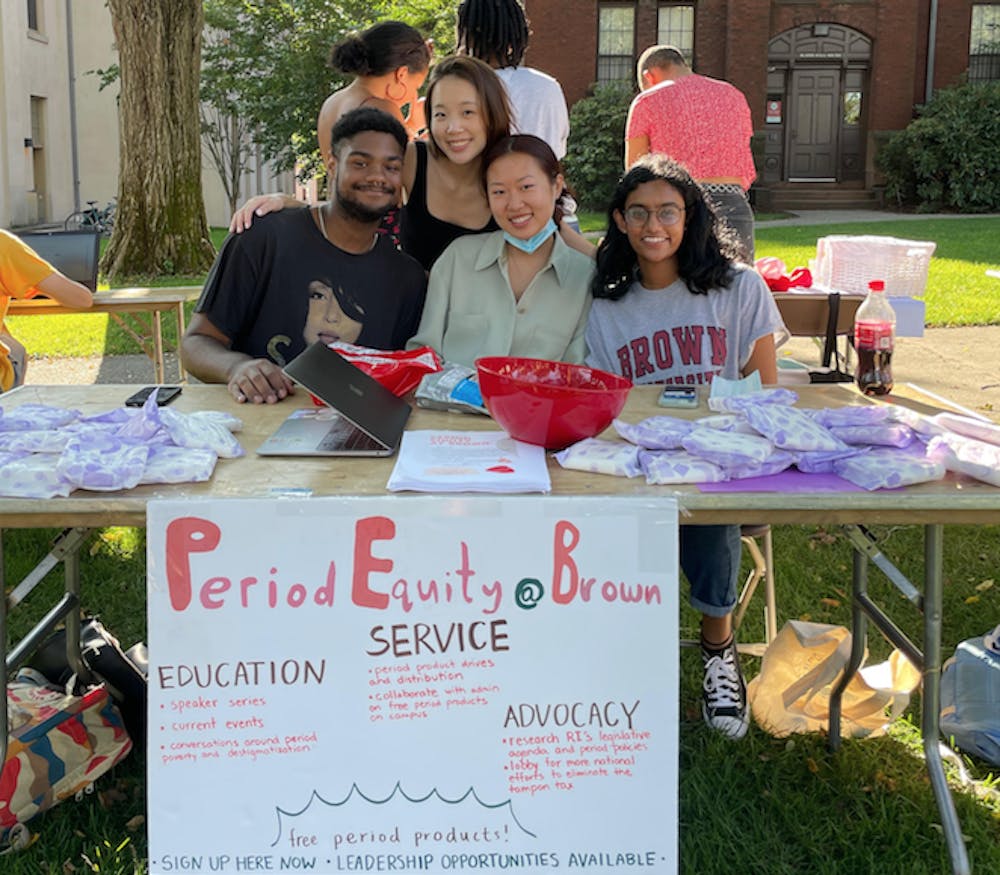Student-run organization Period Equity at Brown is working to increase access to menstrual products on campus and across the state by holding period product drives and advocating for legislative change. Currently, the organization is hosting an on-campus drive to collect pads and tampons to distribute to local shelters serving community members experiencing houselessness.
Quinn Coleman ’23, PEB service director, and Irene Sung ’23, PEB advocacy director, conceptualized the organization after discovering their shared passion for period justice during their freshman year. Working with their co-founder Mina Kao ’23, PEB education director, the organization was formally approved by the Student Activities Office and began operations at the beginning of the fall semester.
Alongside holding drives, PEB aims to educate the Brown community on menstrual justice through weekly meetings.
Coleman, Sung and Kao agreed that the perceived lack of knowledge regarding menstruation among the general public was a major factor in founding the organization. After attending a global health conference featuring Nadya Okamoto, founder of Period Inc., an organization aimed at ending period poverty, Coleman realized how incomplete his knowledge about menstruation was. Period poverty describes a lack of access to affordable sanitary products.
“There’s so many other people who have less access to education and to that knowledge that I had,” Coleman said, prompting his interest in expanding education on menstruation.
The organization is also planning to engage in long-term advocacy. It plans to contact state representatives and advocate for the creation of a bill that would increase access to period products for incarcerated people in Rhode Island. Sung noted that period justice is a major issue in the nation’s prison system, and the club leaders see the current allocation of menstrual products in prisons as insufficient. “Supplying a few pads and tampons to incarcerated menstruators (is) not enough,” Sung said.
Sung explained that PEB’s next step is to contact state representatives on a regular basis in the hopes that the organization will eventually be able to contribute to the drafting of a bill. According to Sung, “accessibility is not just (providing) a few products every month,” but instead requires “unlimited accessibility” to menstrual products in both quantity and product type.
Sung added that she started a project at her previous school in South Korea to provide free menstrual products in all bathrooms. But when she tried to host a period product drive at her school, the boxes were taken by faculty members — showing Sung how stigmatized menstruation is.
In early high school, “I didn’t even really think about … how this was just a given for me that I could always access pads and tampons,” Kao said. The challenges she encountered while trying to organize a sanitary product drive made her realize how hard it was to increase accessibility to menstrual products due to the social stigma surrounding it.
Ongoing efforts by menstrual justice advocates to change menstruation terminology to make it more inclusive — including the use of “menstruators” instead of “women” and “menstrual hygiene products” instead of “feminine hygiene products” — can make some even more uncomfortable when discussing menstruation, Coleman added. Still, the organization’s leaders agreed that inclusivity is an essential part of menstrual justice moving forward.
“We have a commitment to make it very clear that (fostering inclusivity) is what needs to happen,” Coleman said. “We need to change our language around menstrual hygiene products and menstruators.”
Sung noted that inclusive language will be applied to all of the organization’s advocacy efforts, including the legislation it aims to propose for increasing access to menstrual products in state prisons.
“It’s not just incarcerated women” who experience menstruation, she said. “These products should not just be in female bathrooms, but also gender-neutral bathrooms.”
The use of this terminology “is very, very important because that’s kind of the basis of what the Department of Corrections is going to follow,” Sung added. “That’s going to create our new standard and the new normal.”





